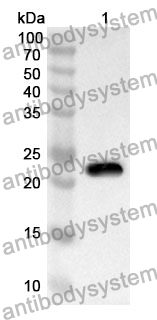Catalog No.
PHC24001
Species reactivity
Human, Rat
Host species
Rabbit
Isotype
IgG
Clonality
Polyclonal
Immunogen
E. coli - derived recombinant Human PROS1 (Lys481-Pro667).
Tested applications
ELISA: 1:4000-1:8000, IHC: 1:50-1:100, WB: 1:1000-1:4000
Target
PROS1,Vitamin K-dependent protein S,PROS
Purification
Purified by antigen affinity column.
Accession
P07225
Applications
ELISA, IHC, WB
Form
Liquid
Storage buffer
0.01M PBS, pH 7.4, 50% Glycerol, 0.05% Proclin 300.
Stability and Storage
Use a manual defrost freezer and avoid repeated freeze thaw cycles. Store at 2 to 8°C for frequent use. Store at -20 to -80°C for twelve months from the date of receipt.
Diagnosing protein S deficiency - Navigating challenges., PMID:40419135
In Situ Proefferocytosis Microspheres as Macrophage Polarity Converters Accelerate Osteoarthritis Treatment., PMID:39780612
[Hereditary protein S deficiency in a patient with prominent mesenteric venous thrombosis: A case report]., PMID:39690778
Multifocal osteonecrosis due to the synergistic impact of inherited thrombophilia, autoimmunity, and pregnancy: A case report., PMID:39363854
The Vitamin K-Dependent Anticoagulant Factor, Protein S, Regulates Vascular Permeability., PMID:38666935
[The 492nd case: recurrent thrombosis, thrombocytopenia]., PMID:35090264
Qualitative and Quantitative Comparison of Plasma Exosomes from Neonates and Adults., PMID:33672065
Identification of Potential BRAF Inhibitor Joint Therapy Targets in PTC based on WGCAN and DCGA., PMID:33613767
MERTK Inhibition: Potential as a Treatment Strategy in EGFR Tyrosine Kinase Inhibitor-Resistant Non-Small Cell Lung Cancer., PMID:33562150
Mer tyrosine kinase as a possible link between resolution of inflammation and tissue fibrosis in IgG4-related disease., PMID:33512463
TAM receptors: A phosphatidylserine receptor family and its implications in viral infections., PMID:33234246
Anti-Axl antibody treatment reduces the severity of experimental autoimmune encephalomyelitis., PMID:33121494
High Prevalence of Acquired Thrombophilia Without Prognosis Value in Patients With Coronavirus Disease 2019., PMID:32972320
Anticoagulant protein S in COVID-19: low activity, and associated with outcome., PMID:32841167
Profile of natural anticoagulant, coagulant factor and anti-phospholipid antibody in critically ill COVID-19 patients., PMID:32648093
Protective Role of the MER Tyrosine Kinase via Efferocytosis in Rheumatoid Arthritis Models., PMID:29706963
Activation of the Receptor Tyrosine Kinase AXL Regulates the Immune Microenvironment in Glioblastoma., PMID:29531161
Thrombophilia with an onset symptom of intracranial venous thrombosis: A case report and review of the literature., PMID:28587373
Ligand Activation of TAM Family Receptors-Implications for Tumor Biology and Therapeutic Response., PMID:27916840
Protein S exacerbates alcoholic hepatitis by stimulating liver natural killer T cells., PMID:25399514
Heerlen polymorphism associated with type III protein S deficiency and factor V Leiden mutation in a Polish patient with deep vein thrombosis., PMID:24365770
A novel splice site mutation in intron C of PROS1 leads to markedly reduced mutant mRNA level, absence of thrombin-sensitive region, and impaired secretion and cofactor activity of mutant protein S., PMID:20022358
Influence of PROS1 gene mutations affecting protein S amino-acid 275 on plasma free protein S measurement., PMID:17393035
Protein S Gla-domain mutations causing impaired Ca(2+)-induced phospholipid binding and severe functional protein S deficiency., PMID:12351389
Homozygosity for the protein S Heerlen allele is associated with type I PS deficiency in a thrombophilic pedigree with multiple risk factors., PMID:10669162

